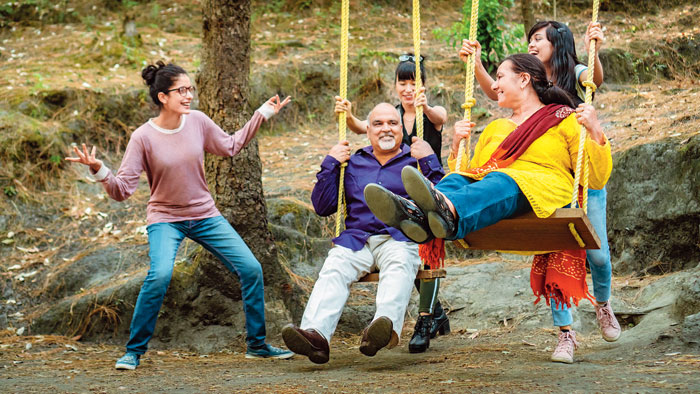While many of us focus primarily on diet and exercise to achieve better health, science suggests that our well-being is also influenced by the company we keep. Researchers have found that certain health behaviours appear to be contagious and that our social networks — in person and online — can influence obesity, anxiety and overall happiness. A recent report found that a person’s exercise routine was strongly influenced by his or her social network.
I was reminded recently of the power of the crowd during a trip. The event attracted a group of like-minded travellers who, despite experiencing various levels of adversity in their lives, including cancer, vision loss and the recent loss of a loved one, were remarkably optimistic and upbeat. The group ranged in age from 17 to 90. One inspiring man, in his 80s, had adopted a vegan lifestyle and a strict exercise routine to control his diabetes. Another new friend, a woman in her 50s who had survived lung cancer, cheered me on and kept me going during a particularly difficult workout.
After the trip, we all promised to keep in touch. Buoyed by the experience, I returned home with a renewed commitment not only to exercise and healthful living, but to simply step up my social life and spend more time hanging out with happy people.
Dan Buettner, a National Geographic fellow and author, has studied the health habits of people who live in so-called blue zones — regions of the world where people live far longer than the average.
He noted that positive friendships are a common theme in the blue zones. “Friends can exert a measurable and ongoing influence on your health behaviours in a way that a diet never can,” he said.
In Okinawa, Japan, a place where the average life expectancy for women is around 90, the oldest in the world, people form a kind of social network called a moai — a group of five friends who offer social, logistic, emotional and even financial support for a lifetime. “It’s a very powerful idea,” Buettner said. “Traditionally, their parents put them into moais when they are born, and they take a lifelong journey together.”
In a moai, the group benefits when things go well, such as by sharing a bountiful crop, and the group’s families support one another when a child gets sick or someone dies. They also influence one another’s lifelong health behaviours.
Buettner is working with federal and state health officials, including the former US surgeon general Vivek Murthy, to create moais in two dozen cities around the country. He recently spent time in Fort Worth, Texas, where several residents have formed walking moais — groups of people who meet regularly to walk and socialise.
The key to building a successful moai is to start with people who have similar interests, passions and values. “You stack the deck in favour of a long-term relationship,” said Buettner.
One of my fellow travellers, Carol Auerbach of New York City, noted that surrounding herself with positive people has helped her cope with the loss of two husbands over the years. Auerbach was widowed at 30, when her children were just two and five.
With the support of her family and friends, and her own tenacity, she was able to support her family, and she eventually remarried. And then in 1992, her second husband died unexpectedly. To cope the second time, she focused on volunteer work.
Auerbach eventually found love again and has been married to her third husband for 15 years. “Life is too short to be around negative people,” she said. “I need people around me who care about me and are appreciative, and see the world as a glass half full, not half empty.”
The Blue Zone team has created a quiz to help people assess the positive impact of their own social network. The quiz asks questions about your friends and the state of their health, how much they drink, eat and exercise, as well as their outlook. The goal of the quiz is to identify the people in your life who score the highest and to spend more time with them.
“I argue that the most powerful thing you can do to add healthy years is to curate your immediate social network,” said Buettner, who advises people to focus on three to five real-world friends rather than distant Facebook friends. “In general you want friends with whom you can have a meaningful conversation,” he said. “You can call them on a bad day. Your group of friends are better than any drug or anti-aging supplement, and will do more for you.”










